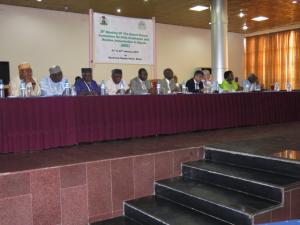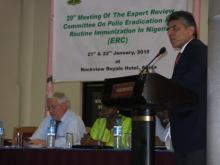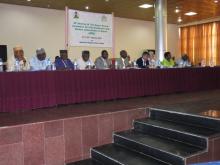29th ERC: Nigeria well positioned to interrupt transmission of WPV
Abuja, Nigeria 23 January 2015 - The 29th Expert Review Committee (ERC) is convinced that Nigeria can get out of WHO’s list of endemic countries with active wild polio virus (WPV) transmission if no WPV is detected for a period of 12 months with adequate surveillance, since the last case was reported on 24th July, 2014.
Dr. Hamid Jafari, the Director of Polio in WHO, who presented the committee’s preliminary feedback at the end of the 2-day periodic meeting held in Abuja from 21-22 January, 2015 , stated that “Progress in Nigeria has opened the door for a polio free Africa”.
For that to happen, the ERC which acknowledged the various innovations being applied to address challenges, strongly endorsed that the country “sustains the hard fought gains and address the risks that threaten interruption of WPV transmission”. The listed threats include: complacency, performance gaps in Kano, insecurity/inaccessibility and diversion of attention with impending general elections.
The ERC therefore recommended among others that Nigeria must crush the cVDPV2 in the second quarter of 2015; implement high quality Supplemental Immunization Activities schedule, with targeted expansion of innovations such as the Directly Observed Polio Vaccination, health camps as well as vaccination in markets and transit points.
Speaking on behalf of government, the Executive Director (ED) of the National Primary Health Care Agency, Dr. Ado Mohammed mentioned that ‘it is obvious that Nigeria is about to make history and for the first time in the country, WPV transmission has not been confirmed in the past 6 months, with new no cases of the wild polio virus in Nigeria since 24th July, 2014.
The ED, who noted that the phenomenal feat was not a miracle but the result of government’s commitment, partners determination and personnel’s’ sacrifice, assured that the Nigerian programme will work against reinfection by addressing the threats as enumerated by the ERC.
Specifically, he stated that “we will work with WHO to heighten surveillance particularly in this last lap of the eradication phase and leverage polio support to broader public health goals”.
Dr. Ado however, tasked partners to avoid complacency in funding as he underscored the importance of adequate resources to urgently scale–up and expand implementation of the proven innovations to timely achieve interruption of WPV and cVDPV in Nigeria.
WHO, Unicef, CDC, Rotary, DFID, JICA, DFATD, USAID, BMGF and EU sent a high-powered delegations to the meeting.
___________________________________
For more information, please contact
Charity Warigon, Communications Officer
Email: warigonc [at] who.int (warigonc[at]who[dot]int)





